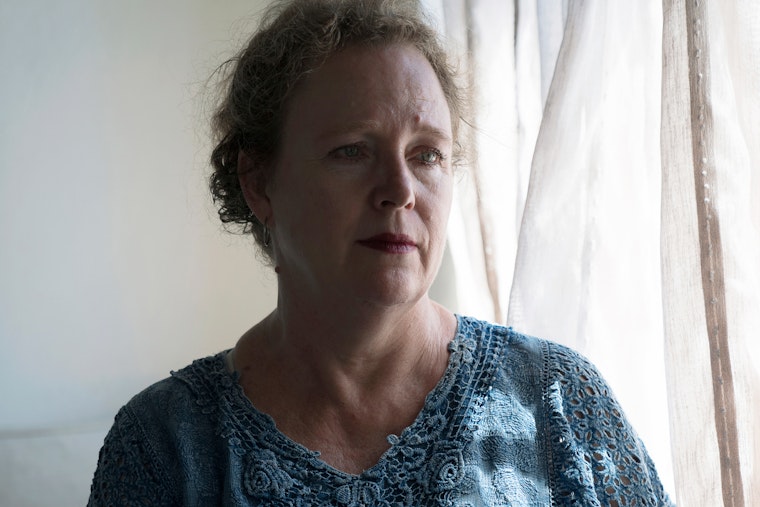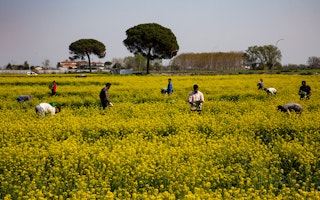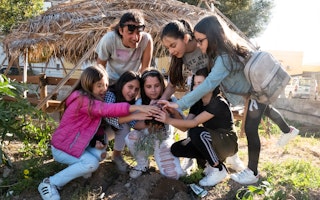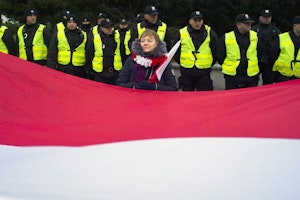Q&A: Forging a Bond between Locals and Refugees

The Greek island of Lesvos hosts over 21,000 refugees, primarily from Afghanistan and Syria. Many have been held there for at least a year, far too often in appalling conditions. For locals, handling the effects of the refugee buildup has been a struggle. Recently, Melinda McRostie of the Starfish Foundation spoke with Open Society’s Manos Moschopoulos about the work her organization does to support both the local community and refugees.
To begin, could you tell us about your background?
I grew up on Lesvos to an Australian mother and a Greek stepfather. My husband and I have a small restaurant in the fishing village of Molyvos, right in the harbor. We have always done a lot of charity work, so when I got a call from the coast guard, in November 2014, and was told that a boat full of refugees had just been brought into the harbor, they asked if I would help.
How did you respond?
I said yes! Some people have said that I had a choice—that I could have just decided not to help—but I never felt that way. I never felt I had a choice. The way I felt about it was, the coastguard asked for help; so, I helped. The end.
These were traumatized families, shivering children, people who are cold and wet and in need. I couldn’t hear their stories and learn about what they were running from, and what they had endured to get here, and not help. I couldn’t do that.
Once you decided to help, what challenges did you confront? How did you overcome them?
One challenge was simply keeping up, because the numbers kept increasing every day. For example, the number of refugee boats arriving in Lesvos went from one per month, to one per week, to one per day and then, at the height of the crisis on our island, to over 70 boats per day.
Another major challenge, to be frank, was the hostility some members of the local community felt toward the refugees. The wall-to-wall media coverage of refugee arrivals to Europe led to a large drop in Lesvos’s tourism industry, which made some locals bitter about both the refugees as well as anyone who helped them. I have many people who were once friends of mine—and even family members—who won’t speak to me anymore because of the work I am doing.

Along those lines, the Starfish Foundation has tried to support the local community, too, rather than having an exclusive focus on refugees. Can you tell us more about those efforts?
Yes, Starfish has funded a variety of local community-driven projects.
After the village of Vrissa was hit by an earthquake, in 2017, for example, Starfish helped rebuild its library. We’ve also funded sailing lessons for local children in the villages of Molyvos and Petra. In Skala Sikamina, meanwhile, we worked with locals both to refurbish their museum and to publish a book about their folklore. We supported a night school in Kalloni with laptops and heating so they could continue their education. And we’ve supported some local, small-scale economic development initiatives, too.
Most significantly, though, we worked with the village of Moria, which is a small community that has been deeply traumatized as a result of its close proximity to a notoriously overcrowded refugee camp. We worked closely with the village association to clean public areas, the playground and streams, which had become littered with trash from the refugee camp.
Why did Starfish work with Moria Village?
Moria camp has the capacity for 3,000 but now has over 19,800 people crammed either between its wire fences or camping directly outside of its borders. The conditions there are awful, and many camp residents—some of whom have been there for months, or even years—have grown desperate.
How so?
They don’t get enough food, so they look for alternative ways to find it, which in extreme cases can mean stealing livestock from local farmers; there is insufficient electricity, so some will steal the electricity lines of local residents so they can have light at night. Villagers ask me, “Why do they cut down our orange trees? We’d happily give them some oranges instead.” But refugees are cutting the trees down because they need the wood to keep warm.
More fundamentally, refugees do these things because conditions at Moria are so appalling and because they’re fighting to keep themselves—and their families—alive. That’s the cause of the schism between the two communities.
Why are these projects important?
Because they support the local community, and they bring locals and migrants together. We fund a business improvement seminar open to all members of our community, for example. Seeing locals and refugees together in this space, discussing the triumphs and the pitfalls of running a business—this is something that was previously unheard of.
The Starfish Foundation is a grantee of the Open Society Foundations.


